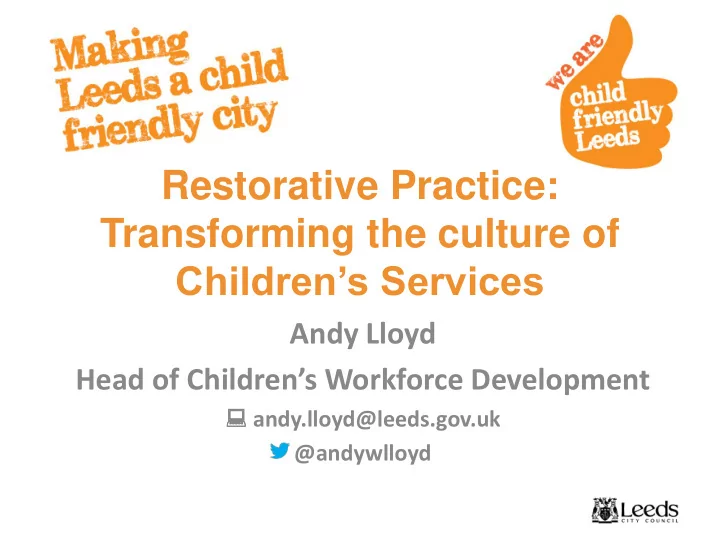

Restorative Practice: Transforming the culture of Children’s Services Andy Lloyd Head of Children’s Workforce Development andy.lloyd@leeds.gov.uk @andywlloyd
Check in • What was your favourite childhood sweet?
I am proud to be a Social Worker!
Social Work today ... • A profession under siege? • Budgets creating pressure on services • Narrowing of the definition of Social Work? • Process not value led? • .... but every day Social Workers are doing extraordinary work with children and families.
Two quotes • A child’s current behaviour is often an essentially sane response to an untenable set of life circumstances Madge Bray • We cannot waste our precious children. Not another one, not another day. It is long past time for us to act on their behalf. Nelson Mandela & Graça Machel.
Workforce Development ... • Is not HR and is not OD • In Leeds, based on three principles: – Child focussed – Restorative in nature – Research informed
Values, Values, Values • “Culture eats strategy for breakfast” • Children live in families, families make communities, communities create cities • Hearing the voice of the child and letting that voice have influence • The child is the client
Restorative Practice is … • Different from Restorative Justice . • About building, maintaining and restoring relationships . • It is not a model or a tool, it is a way of being . • High challenge , High support
What are we doing? • Creating a new social contract between the state and citizens where restorative approaches are an entitlement for families coming into contact with our services. • Developing a model which focuses on working with people not doing things for people, doing things to them … or doing nothing at all. • Based on the “four ways of being” window.
Four ways… To With Challenge Not For Support Adapted from: Wachtel T & McCold P in Strang H & Braithwaite J (eds), (2001), Restorative Justice and Civil Society, Cambridge University Press, Cambridge
The value of circles • Lose the tables • Eye contact • Everyone has a voice • Use of talking pieces • Be mindful of power relationships • Check in / check out
Affective Statements There are two simple formulas: a) I feel ____(the emotion)___ , when ____ (the occurrence)____ eg: I feel humiliated when you shout at me in a meeting b) I feel ____(the emotion)___ , when ___(the occurrence)____, because ____(the reason) ____ and it make me feel _____(the feeling) eg: I feel anxious when we have a team meeting because often you publically criticise me and it makes me feel foolish.
Introducing “ with ” • In: – Teams – Supervision and appraisal – HR issues – Customer relations – Other areas …
Creating the conditions • Support without FOR • Challenge without TO
And finally ... • Be proud of this fantastic profession that you are part of and ... • JUST KEEP SWIMMING!
Recommend
More recommend